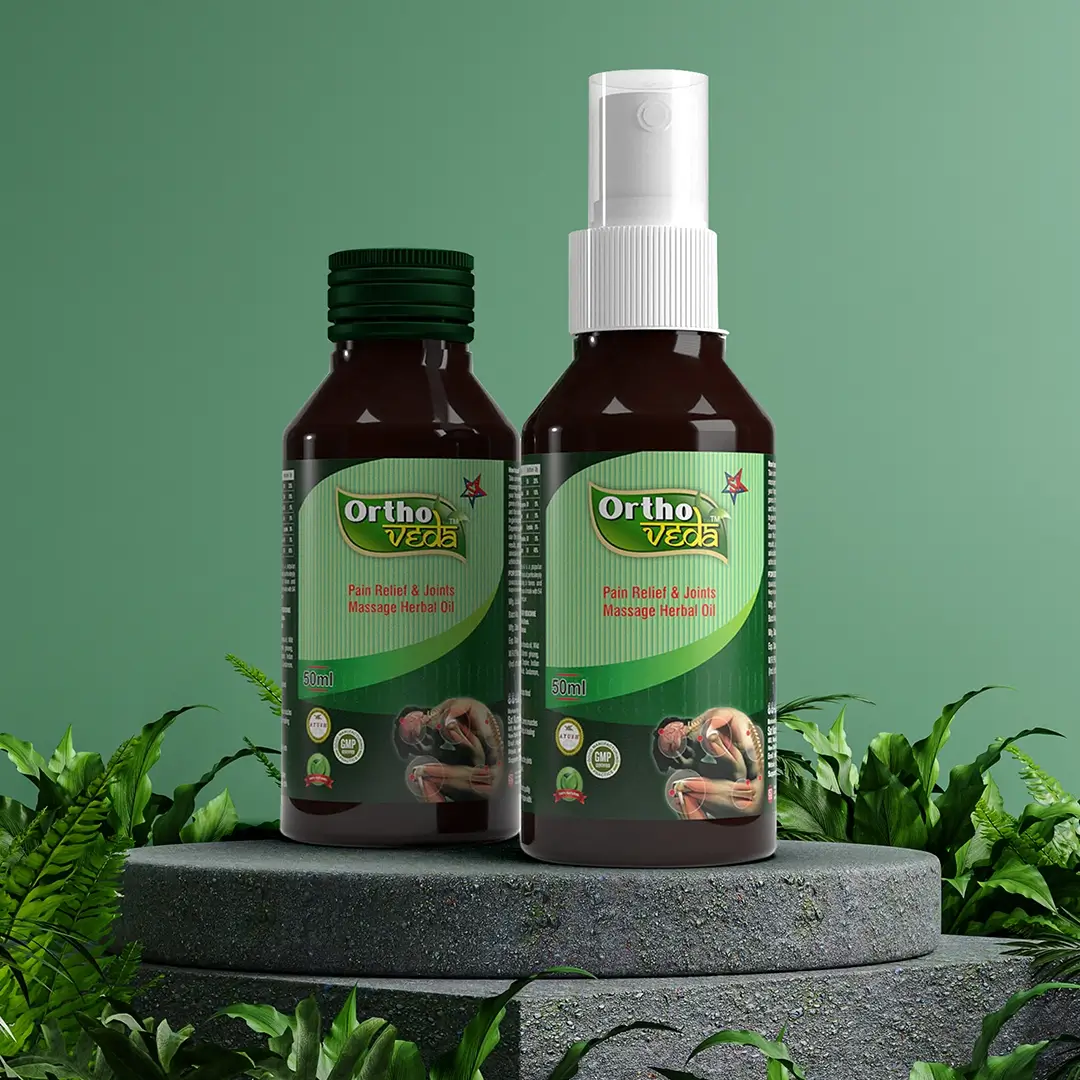Last Updated on December 12, 2024 by Dr. Mansi Srivastava
A joint is formed when two bones meet and allow flexibility and movement. However, certain obstacles in joints may slow down or stop mobility, increasing stiffness, inflammation, and swelling. Such obstacles may be ageing, nutritional deficits, or genetic disorders, which can cause wear and tear of cartilage, leading to the weakening of joints and immobility. However, by sharing information about an Ayurvedic diet for joint pain, this blog will make your life easy.
Connection Between Diet and Joint Pain
The condition of your joints will be better if you have calcium, vitamin A, D, C, Magnesium and other minerals in your daily diet. You may be growing older by age, but relying on such nutrients may minimize stiffness, inflammation and aching of joints. Otherwise, you may experience deterioration in the cartilage of the joints and lose lubrication and mobility by relying on refined carbohydrates or anything high in saturated fats and sugars.
Let’s examine the nutrients and foods that reduce inflammation and may strengthen bones or promote joint health:
Anti-Inflammatory Foods to Add to Your Diet
1. Fruits and Vegetables: Eating berries, spinach, kale and Swiss chard may have positive effects on your body and mind because of the richness of anti-inflammatory compounds.
2. Fatty Fish: Eating fish high in omega-3 fatty acids may aid in recovering from inflammatory conditions arising in the joints. It may be herring, mackerel, anchovies and tuna.
3. Nuts: Snacking on nuts in frequent intervals which may be walnuts or almonds high enough in Vitamin E and Omega 3 fatty acids may reduce the burning sensation and reduce the pain from the root.
4. Olive Oil: It might help with joint anti-inflammatory conditions. A particular type of compound found in olive oil may promote joint connective tissues and increase flexibility.
5. Turmeric: Gout, swelling, and stiff joints are caused by toxins that build up in the joints; turmeric’s curcumin content may help reduce these toxins. It will relax your nerves and increase circulation in joints. Combining with black pepper, adding to curries and also blending with milk may have a high level of effectiveness in the joints and bones.
6. Green Tea: Drinking tea high in anti-inflammatories and antioxidants may aid in recovering from stiffness and painful conditions in joints.
7. Avocados: You may hope for an anti-inflammatory experience in your joints if you are considering avocado for preparing salads or applying it as butter on toast. It may enhance relaxation in joints and prove to be an overall healthy food.
| Image | Order Now | ||
|---|---|---|---|
 |
Order Now |
Nutrients Essential for Joint Health
Major Nutrients That May Nourish Your Bones And Joints Are:
1. Omega 3 fatty acids: Dieting on fatty fish like salmon, tuna, sardine, almonds, nuts, pine nuts, flax seeds and chia seeds may help you get an abundance of Omega 3 fatty acids for boosting strength in your joints and bones.
2. Vitamin D: Your bones would become stronger if you relied on vitamin D because it would speed up the process of the bones absorbing it. Vitamin D is found in fatty fish, fortified dairy and soy milk.
3. Vitamin C: Collagen found in Vitamin C can prevent further cartilage loss and support joints and bones. Eating lemons, strawberries, pineapples, and oranges would fulfil the body’s Vitamin C requirement, control weight loss, and stimulate mobility.
4. Calcium: The vital nutrient for bones and joints, calcium may aid in the healing process of joint and muscle weakness and fragility.
5. Antioxidants: Antioxidants fulfil the nourishment requirement of the bones and joints. To decrease stiffness and inflammation and improve mobility, you can find a lot of antioxidants in foods like kale and leafy greens. These vegetables may increase the longevity of your joints and bones and strengthen your joints.
6. Curcumin: It may bring relief from weakness existing in the joints and bones. Turmeric and mango ginger are high in curcumin to add nourishment to your joints and bones and bring relief from toxins and free radicals.
Foods to Avoid for Joint Health
Certain foods that happen to threaten the health of joints and bones are:
- Sugary foods and drinks: Sugary drinks and foods may weaken your joints by increasing the percentage of uric acid.
- Refined carbohydrates: Eating white bread, white rice, and pasty and sugary food items may increase the inflammatory response in the joints and decrease mobility.
- Dairy products: High amounts of saturated fats found in unpasteurized milk, ice cream, cream cheese, custard, or butter may not be good for joint health issues.
- Fried foods: Fried food may be especially harmful to joints because it contains more saturated fats and fewer omega-3 fatty acids, which can cause inflammatory conditions.
- Trans foods: These foods might contain a lot of harmful fats that can erode your bones and joints.
- Night-shade vegetables: Solanine is a particular chemical found in eggplant, tomatoes, and potatoes that may be responsible for triggering arthritis in joints.
- Foods with high levels of salinity: Depending highly on saline-based food items may increase the risk of Rheumatoid arthritis in joints and bones.
- Tobacco and alcohol: Certain forms of chemicals released during smoking may threaten joint health. Drinking alcohol may also risk the condition of weak joints by damaging the tissues with inflammation.
Hydration and Joint Health
Drinking water would help in moving the nutrients to the joints and enhancing the synovial fluid. Maintaining adequate hydration may help reduce cartilage loss and relieve muscle cramps because 65 to 80 per cent of cartilage is made of water. Consuming adequate water may help eliminate toxins and joint pain while promoting mobility. You may also experience recovery from joints while drinking vegetable juices made from aloe vera, carrots and beetroots.
Sample Diet Plan for Joint Pain Relief
Make sure that you have natural, inorganic, fresh and warm food items that might improve the longevity of bones.. Alternatively, you may plan for an Ayurvedic diet for joint pain recovery. But, a non-vegetarian diet is strictly not recommended during any ayurvedic dosage.
Breakfast
Non-Ayurvedic way:
- You can have oatmeal porridge with berries and cinnamon. This specific breakfast may add nutritional value to your body and mind.
- You may also go for chia seeds, almonds and turmeric in your diet to improve the quality of joint health.
- You can also have multigrain dosha with tomato or green chutney and 1 glass of skimmed milk.
Ayurvedic Way: You may consume porridge made from moong dal and rice with ghee in it.
Lunch:
- Non-Ayurvedic way: It will be suitable for a vegetarian to consume 1 cup of rice, Mushroom curry 1/2 cup, ladies’ finger sabji 1/2 cup, and celery salad 12 cup.
- As a non-vegetarian, you can have chicken curry or fish along with rice, mixed vegetable curry, lentil curry and salads.
Ayurvedic way: You can use roasted makhana, milk, and misri (for sweetness) in place of sugar after having stews or soups, and khichdi cooked with rice and pulses.
Snack: Consuming a cup of warm milk with a few walnuts. It is applicable in the case of Ayurveda also.
Dinner:
Non-Ayurvedic Method: You can eat lean protein (perhaps chicken or fish) and multigrain roti. A vegetarian can manage joint pain by eating soybean or mixed vegetable curry made with peas and beans.
Ayurvedic Way: A natural diet for joint pain recovery is roti prepared from grains like bajra and ragi, along with a mixed vegetable dish made with a drumstick, bitter gourd, snake gourd, and punarnava. Don’t forget to add ghee to your roti for better taste and quicker joint recovery.
Conclusion
Joint pain becomes unmanageable with the ageing process because the ageing body demands more nutrients to control cartilage loss, and inflammation and increase lubrication. lack of proper nourishment may weaken the bones and joints and decrease mobility. There is a need to avoid ultra-processed foods and high sugars to increase the longevity of the bones. Vitamins A, C, D, magnesium and certain antioxidants may strengthen and increase bone density and reduce cartilage loss.





